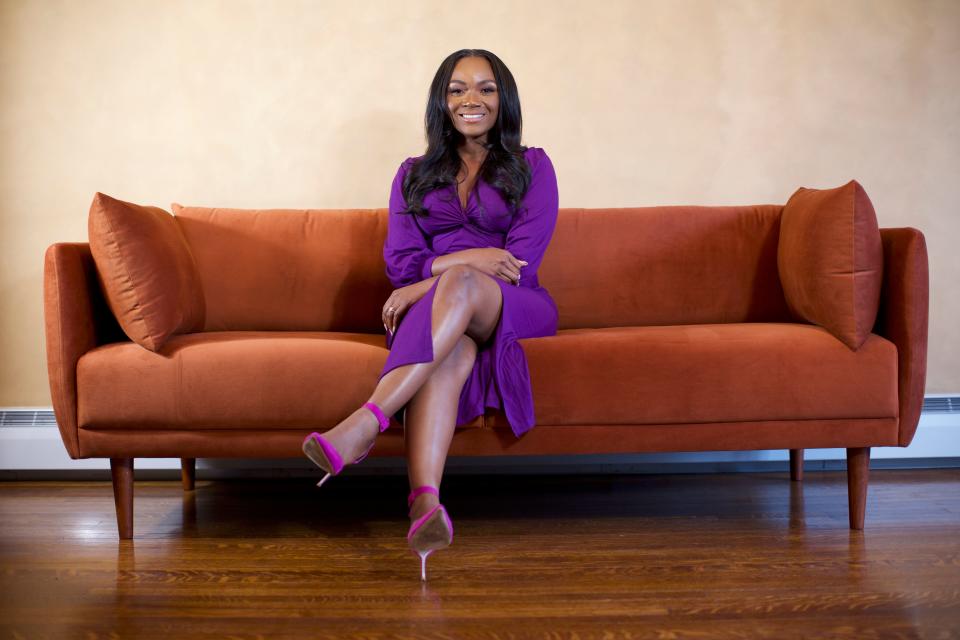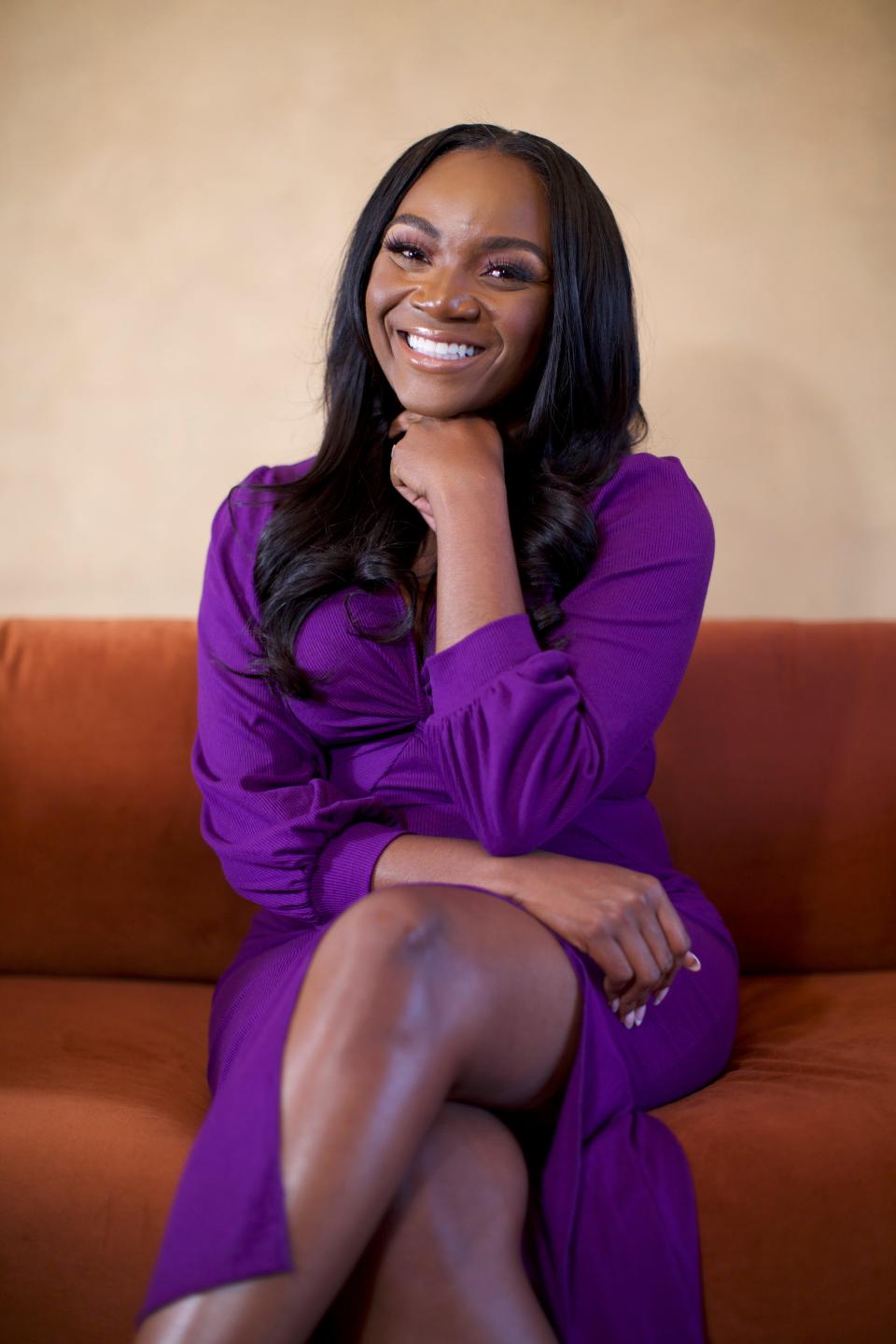After developing a COVID-19 vaccine, scientist continues to research, educate about vaccines
Kizzmekia Corbett is one of USA TODAY’s Women of the Year, a recognition of women across the country who have made a significant impact. The annual program is a continuation of Women of the Century, a 2020 project that commemorated the 100th anniversary of women gaining the right to vote. Meet this year’s honorees at womenoftheyear.usatoday.com.
In most circles, Kizzmekia Corbett would be credited for helping save the lives of millions of Americans. Her role in developing the COVID-19 vaccine certainly catapults her to hero status.
Instead of taking a victory lap, Corbett continues to work – not as much in the lab but in outreach and education – to help lift the country out of the depths of this deadly pandemic.
"For a virus like the virus that causes COVID-19, we knew from the beginning that we would need a vaccine in order to rise out of the pandemic," she said. "So the work that we did was to ensure that we got a vaccine in record-breaking time but also that it was safe and effective."
Corbett is the lead scientist for coronavirus vaccine research at the National Institutes of Health. Her team developed and evaluated the COVID-19 Moderna vaccine. She sees her role as a communicator around the science. It's her job to teach and to empathize – despite all the anti-vaccination noise.
"I had to navigate it with grace – and also understanding," Corbett said. "I think that what I realized in this moment is that much of the debate around vaccines during this time came because there was so much that we hadn't taught people, whether it be about how the immune system works or even about the technology that had been really being developed behind the scenes for so many years. And so it was our time to really step away from the science, so to speak, but then to become the world's vaccine teacher."
Corbett, 36, a North Carolina native, is an assistant professor of immunology and infectious diseases at Harvard T.H. Chan School of Public Health. She meets with community and national organizations to answer questions about her work.
"You never really think, in my lifetime I might have to be called to make a vaccine, evaluate a vaccine and then to have that vaccine go into millions of arms around the world," she said. "But I have been preparing in the sense that I've always understood just how important vaccinology is. I've always thought that vaccines were one of the ways that we could get out of infectious diseases, whether it be pandemic or otherwise. And so I've invested my entire career in vaccinology."
She hasn't taken a "full moment" to celebrate her accomplishments. Science doesn't rest.
"I'm still working, I'm still working," she said. "I still consider the job not complete until we have a very holistic understanding of every single person on what vaccines are and how they work and how good they are. So I still feel like I have a lot of teaching to do."
You’re a woman, you’re Black, you’re a scientist. How important is it to be at the table? To have role models you can relate to?
It is probably the most important part of defining yourself is to have consistent reminders that the person that you feel like you can be or want to be exist. And that someone has paved the way, someone has walked in those shoes.
Representation is so important. It is absolutely so important. I don't come from a place where I have family members who were in STEM (science, technology, engineering and mathematics) or who were scientists, and certainly didn't have Ph.D.s. Because I was exposed to a Black scientist, in my first laboratory experience, I'm pretty sure that really set the tone of 'OK, you can do this. You can do this.' There has to be some reminder, especially because embarking on any career path is certainly not always easy. And so you have to be reminded that you belong there.
What is your proudest moment?
My proudest moment is getting my doctoral degree (from the University of North Carolina). I know that I've invented a vaccine, but I definitely come from a place where that probably was not supposed to happen. In so many aspects, the odds were stacked against me. And so it was a proud moment, especially because I am first-generation, four-year college graduate. I'll hold on to that one for a long time.
What does your cohort look like? Are you in a very male-dominated workforce? Or has that changed over the years?
It's certainly getting better. Women in STEM are few and far between, especially as you rise in the rankings and become principal investigators. In academia, we have chairs of departments and directors of institutes. So there are a few women who are at the top. One of the things that I've learned over the past 16, 17 years, since I first started in the laboratory, is that it is getting better. We're becoming more understanding that it's so necessary for us to have a diverse workplace, not just for STEM but across the board. I'm really excited about what the future holds in that regard.

What is your definition of courage?
Faith's little sister. Courage is the strength to do what faith says you have to do.
Who are your role models?
I loved Toni Morrison; I studied Tony Morrison. I probably knew more about her and many other Nobel laureates than I would like to admit. My mom is certainly a role model for me, my grandparents, my ancestors, right, because of just how they've paved the way for me and so many more. I like to look to women for inspiration in whatever capacity, not necessarily women who are just in science but women in all arenas. They have a way about them that almost makes the world turn. I'm consistently inspired how each woman just takes her purpose and utilizes it for the greater good of everyone.
What advice would you give your younger self?
Take the nap. When I was in high school, studying all night or college, studying all night to get the 99 instead of the 93, take the nap. You'll need your rest when you're fighting a pandemic. And in general, I think that's one thing that I wish I would have learned sooner is how important rest is for mental health and productivity.

How do you overcome adversity?
God. God for sure. There's a song, "The Battle Is Not Yours." I think that's really the only way that you overcome a lot of things.
How far have women come, in your opinion, and how far do we still have to go?
We have a long way to go. There's a pay gap. There are consistent ideas about certain fields, particularly ones that are more technical, like STEM. People consider them to be sometimes too hard for women to take on. We definitely have a long way to go culturally in the way that we accept women into the STEM fields. But we've come far. I feel more welcome today as a woman in STEM field, in one of the best universities in the world at Harvard, than I have ever felt in my entire career.
What do you do to relax?
I enjoy a glass of champagne. I do love music. I enjoy going to comedy shows and plays. I'm starting to decorate our new home, so that's fun. I'm wedding planning, and that's fun. And I actually enjoy time with my friends. I tend to be a lot more social than many people would expect a scientist to be. And so hanging out with my friends is always rejuvenating to me.
National columnist/deputy opinion editor Suzette Hackney is a member of USA TODAY’S Editorial Board. Contact her at shackney@usatoday.com or on Twitter: @suzyscribe
Women of the Century: Maya Angelou among inspiring women on North Carolina list along with other civil rights activists
Explore the project
This article originally appeared on USA TODAY: COVID vaccines: Meet the NIH scientist who developed the Moderna shot

